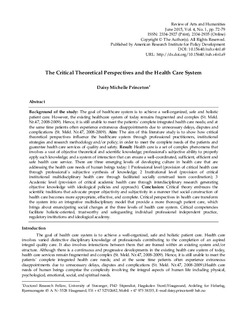| dc.description.abstract | Background of the study: The goal of healthcare system is to achieve a well-organized, safe and holistic patient care. However, the existing healthcare system of today remains fragmented and complex (St. Meld. Nr.47, 2008-2009). Hence, it is still unable to meet the patients´ complete integrated health care needs; and at the same time patients often experience extraneous disappointments due to unnecessary delays, disputes and complications (St. Meld. Nr.47, 2008-2009).
Aim: The aim of this literature study is to show how critical theoretical perspectives influence the healthcare system through professional practitioners, institutional strategies and research methodology and/or policy; in order to meet the complete needs of the patients and guarantee health care services of quality and safety.
Result: Health care is a set of complex phenomena that involves a vast of objective theoretical and scientific knowledge; professional's subjective ability to properly apply such knowledge; and a system of interaction that can ensure a well-coordinated, sufficient, efficient and safe health care service. There are three emerging levels of developing culture in health care that are addressing the health care needs of human beings today: 1 Professional level (provision of critical health care through professional´s subjective synthesis of knowledge; 2 Institutional level (provision of critical institutional multidisciplinary health care through facilitated socially construed team coordination); 3 Academic level (provision of critical academic health care through interdisciplinary research generating objective knowledge with ideological policies and approach).
Conclusion: Critical theory embraces the scientific traditions that advocate proper objectivity and subjectivity in a manner that social construction of health care becomes more appropriate, effective, and complete. Critical perspectives in health care transform the system into an integrative multidisciplinary model that provide a more thorough patient care, which brings about emancipating social changes at the three levels of health care system. Critical competencies facilitate holistic-oriented, trustworthy and safeguarding individual professional independent practice, regulatory institutions and ideological academy. | nb_NO |
